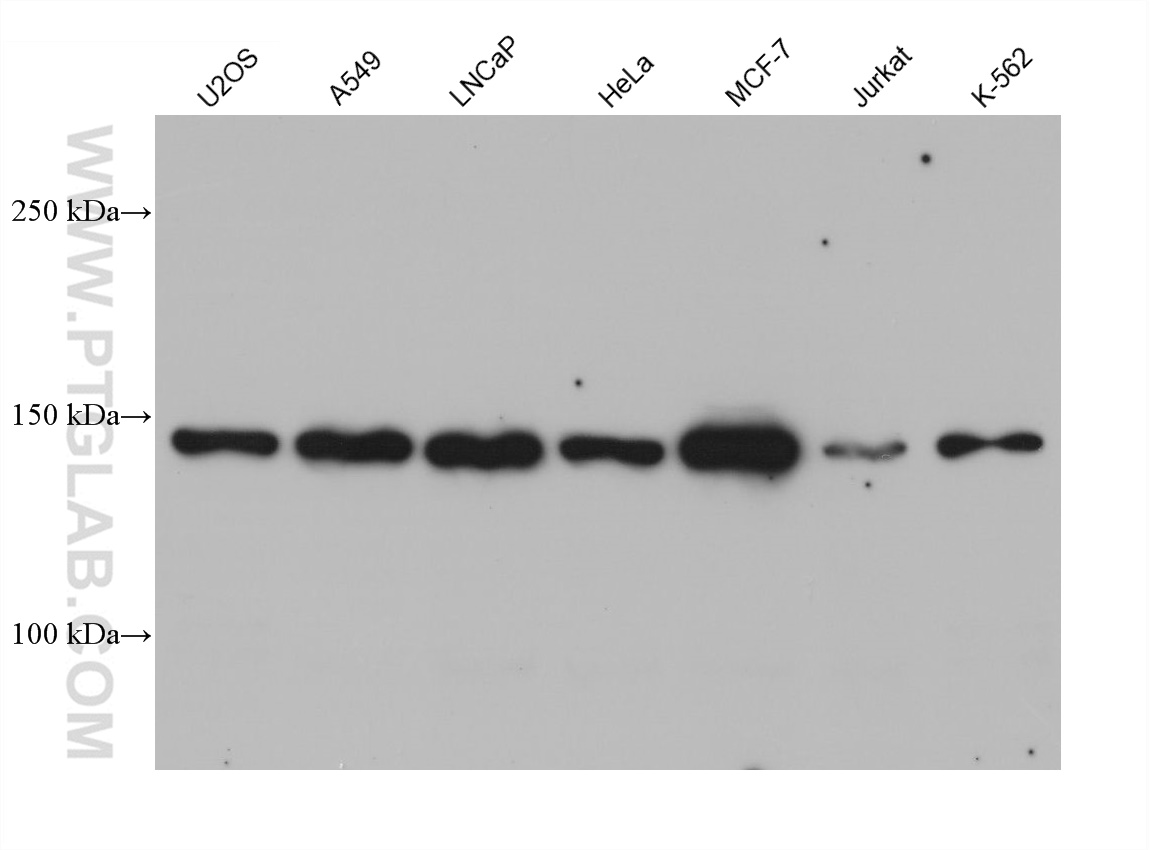验证数据展示
经过测试的应用
| Positive WB detected in | U2OS cells, A549 cells, LNCaP cells, HeLa cells, MCF-7 cells, Jurkat cells, K-562 cells |
推荐稀释比
| 应用 | 推荐稀释比 |
|---|---|
| Western Blot (WB) | WB : 1:2000-1:10000 |
| It is recommended that this reagent should be titrated in each testing system to obtain optimal results. | |
| Sample-dependent, Check data in validation data gallery. | |
产品信息
68708-1-Ig targets SDCCAG1 in WB, ELISA applications and shows reactivity with human samples.
| 经测试应用 | WB, ELISA Application Description |
| 经测试反应性 | human |
| 免疫原 |
CatNo: Ag2467 Product name: Recombinant human SDCCAG1 protein Source: e coli.-derived, PGEX-4T Tag: GST Domain: 48-397 aa of BC020794 Sequence: EDITLQSGRDELNEELIQEESSEDEGEYEEVRKDQDSVGEMKDEGEETLNYPDTTIDLSHLQPQRSIQKLASKEESSNSSDSKSQSRRHLSAKERREMKKKKLPSDSGDLEALEGKDKEKESTVHIETHQNTSKNVAAVQPMKRGQKSKMKKMKEKYKDQDEEDRELIMKLLGSAGSNKEEKGKKGKKGKTKDEPVKKQPQKPRGGQRVSDNIKKETPFLEVITHELQDFAVDDPHDDKEEQDLDQQGNEENLFDSLTGQPHPEDVLLFAIPICAPYTTMTNYKYKVKLTPGVQKKGKAAKTALNSFMHSKEATAREKDLFRSVKDTDLSRNIPGKVKVSAPNLLNVKRK 种属同源性预测 |
| 宿主/亚型 | Mouse / IgG2a |
| 抗体类别 | Monoclonal |
| 产品类型 | Antibody |
| 全称 | serologically defined colon cancer antigen 1 |
| 别名 | Ribosome quality control complex subunit NEMF, NY CO 1, Nuclear export mediator factor, NEMF, Homo sapiens (Human) |
| 计算分子量 | 1076 aa, 123 kDa |
| 观测分子量 | 130-140 kDa |
| GenBank蛋白编号 | BC020794 |
| 基因名称 | SDCCAG1 |
| Gene ID (NCBI) | 9147 |
| RRID | AB_3670401 |
| 偶联类型 | Unconjugated |
| 形式 | Liquid |
| 纯化方式 | Protein A purification |
| UNIPROT ID | O60524 |
| 储存缓冲液 | PBS with 0.02% sodium azide and 50% glycerol, pH 7.3. |
| 储存条件 | Store at -20°C. Stable for one year after shipment. Aliquoting is unnecessary for -20oC storage. |
背景介绍
SDCCAG1, also named as NEMF, is a nuclear export mediator. It can be bound to translocon-engaged 60S subunits on native ER membranes. Human SDCCAG1 has been implicated in lung cancers and it may function as a tumor suppressor gene. SDCCAG1 inactivation contributes to the transformed state of human lung cancer cells (PMID:16103875, 10575219). NEMF is also regarded as a potential biomarker for the detection of active and latent TB infections (PMID: 26818387).
实验方案
| Product Specific Protocols | |
|---|---|
| WB protocol for SDCCAG1 antibody 68708-1-Ig | Download protocol |
| Standard Protocols | |
|---|---|
| Click here to view our Standard Protocols |


